- Home
- Grace Thompson
Gull Island Page 8
Gull Island Read online
Page 8
‘Since when did they need a reason?’ Bending over the fire, fiercely stirring the soup simmering in the black, soot-encrusted pot, Mrs Carey took a deep breath to control her sobs and added, ‘We’ll all have to go on the parish. The children will go into a home for waifs and strays. Separated we’ll be, after all me and Henry have done to keep us together.’
‘Is it Rosita, crying all the time? Is that why they’ve asked you to go? If it is, then I’ve got a surprise for you. I’ve got a place to go. I can leave and that will settle it.’ She patted the distressed woman’s shoulder and said brightly, ‘I was offered a job in that letter that came last week. It was from a farmer offering me a job. What d’you think of that, then? Talk about coincidence. It was meant to be. I’ll go and talk to the landlady now, this minute. We’ll change her mind for sure when she knows I’m taking my lovely, noisy daughter from the house.’
‘It’s no use, Barbara. The rooms are let and the new people – paying more than us, mind – are coming on Saturday week at twelve.’
Richard was sitting on the stairs and when Barbara opened the back door to go down to the ty bach he pulled at her skirt. ‘Barbara, remember that old house on the beach, the one with the porch all broken and falling about? Why can’t we all go there? No one owns it. Gone away they have, the family who used to live there. Luke and me, we started to mend it.’
‘You’ve seen Luke?’
‘Not this ages. His cottage is always locked up now. There’s a padlock on the door so even if he came back he couldn’t get in. I saw the other man come and he had it fixed. I think it was Luke’s father, even though Luke always said he hasn’t got a family.’
Throughout the winter months Barbara had often thought about Luke but lack of time as well as lack of energy prevented her from walking the two miles to the lonely beach in the hope of seeing him. ‘Shall we go on Sunday? See if he’s there? If the boat is still on the beach he might have left a note.’
Richard shook his solemn head. ‘Looked everywhere I have.’
‘We’ll go anyway.’ Barbara had a strong need to talk to Luke about her half-made decision to go back to the farm. Being outside the limited circle of people who made up Barbara’s life, his opinion mattered. She knew he was more worldly and his comments would be honest and helpful. Although they knew each other so slightly, she trusted him to have her interests at heart. Perhaps, she thought with a faint glimmer of hope, he might even think of a better solution than returning to the farm. She shuddered at the prospect of sleeping again under the same roof as Graham Prothero. His persistence would hardly have lessened. He knew who the letter had come from.
‘We can look at the house, can’t we?’ Richard said, breaking into her thoughts. ‘We can take the bogie and bring back firewood.’
‘Yes, we’ll take food and have a picnic – even if it’s raining.’ A necessary proviso to avoid disappointment.
Five of them set off for the picnic a few days later. With the solemn-faced Blodwen in her undisputed place on the bogie, propped up with blankets and an ancient cushion, they walked through the lanes, singing and laughing with excitement.
Luke was there when they reached the narrow beach near Gull Island. The sound of oars made them turn their heads to see the small rowing boat making its way towards them. The oars lay still for a moment and his hand came up in an excited wave. Breathless, Barbara waited for him to touch the rocky shore and climb out to greet them.
There seemed to be so much to say, both herself and Richard talking at the smiling man in unison, each trying to grab his attention and share their news. Eventually he covered his ears with his hands and laughingly told Richard and the others to go and find some driftwood for a fire. ‘I’ve caught a few small fish,’ he told them. ‘And we’ll cook them on the beach.’ He turned towards Barbara, his thin face lined and sad, but lighting up as he smilingly took the sleeping child from her.
‘If I’d had a boy I’d have called him Luke,’ she said shyly.
‘No, and another girl next, too. When you marry,’ he said, looking at her for the first time.
Barbara laughed. ‘Bernard is dead. There won’t be any more.’
‘You’re young. You’ll marry.’
‘If there are any young men left to marry after this terrible war.’
Luke’s lips tightened at the reminder of the young man for whom he still grieved.
While Luke sat and nursed the baby, Barbara helped the others to gather wood for the bonfire, then when Luke reluctantly handed her back, she watched as he showed them how to cook fish in the large pan he kept hidden. After scouring it clean, he collected more water from the pump and placed the fish in to gently poach. He made no attempt to go into the cottage and, curious, Barbara walked to the door to see if what Richard had told her was true.
Luke saw her and while the fish cooked, watched over by Richard, he told her quietly what had happened when his father had called.
‘He’d always disliked Roy and did everything he could to discourage my friendship with him and his extrovert family,’ he said. ‘A mention of his name brought on furious anger. When I told him I loved Roy, he went berserk, hitting me. Making it sound sordid. But I did love him, and his family, who always made me feel good about myself, and happy to be with them.
‘When Roy died I had to grieve alone as I was forbidden to go and seek comfort from Roy’s family. His last letter came from a place called Ypres. “Wipers”, the soldiers nicknamed it. I’ll go and find it one day when the war is finally over. My father can’t understand how I found something with Roy and his family that I couldn’t find at home.’ He frowned for a moment. ‘It was there that I was allowed to be myself, I suppose.’
Moments passed and he was unaware that he was holding his breath, wanting her to understand, afraid of her reacting as his father had done, with disgust. Then Barbara turned and hugged him. ‘There are lots of ways of loving, Luke. Many kinds of love. All are beautiful. Your father hasn’t learnt that. Pity for him, isn’t it?’
Arm in arm they walked back to the others. For Luke it was as if a band of steel had been removed from around his chest. He could breathe freely for the first time in many months. What did it matter if his father despised him? If only one person could believe that his love for Roy hadn’t been sordid, then the world was not empty. Lighthearted, he helped share out the food and the atmosphere became a celebratory party.
The children whooped and shouted and sang and danced, all except Blodwen who retained her slightly haughty manner throughout. Luke studied her curiously. She rarely spoke yet she seemed to be watching, taking in everything that was said and done. Was she observing the stupidities of the human race? And would it all come out one day in a great gale of laughter?
While the younger children built houses and castles with the smooth pebbles, Luke and Barbara followed Richard to examine the house. The porch, repaired by Luke, had remained standing and was firm and strong. It was no longer as clean as Luke had made it. Inside there was sand and stones and the dry debris of many years, blown back to its place soon after Luke had brushed it out. The walls and roof appeared to be dry and sound and there was nothing to discourage the idea of the Careys using it for a home.
‘I’ll sleep there myself for a night or two – better than trying to keep warm under the upturned boat! Next weekend we can work together, fix the windows and make it weatherproof. There’s all the summer in front of us, remember, and by next winter it will be as snug a home as anyone can wish for.’
Richard’s face was fixed in a tight grin that nothing would move. He watched Luke survey the floorboards and, like a miniature adult, discussed with him the most necessary needs. Smilingly, Luke nodded at the six-year-old’s recommendations and made notes on an old envelope.
‘You’re right, I hadn’t thought of that,’ he said frequently. Or, ‘That’s an excellent suggestion, Richard.’ And he would scribble furiously on his paper with his scratchy pencil, licking its indelible lead to s
trengthen the letters.
‘He really does have a good idea of what’s needed, you know,’ Luke said to Barbara when they were preparing to leave. ‘He’s only six, yet he understands some things so well. And understands things so fast. If he’d been able to have a good education, there’s nothing he couldn’t achieve.’
It wasn’t until the bogie was packed, with the driftwood tucked tightly around little Blodwen, and they were setting off home, that Barbara had a chance to talk to Luke about the possibility of returning to farmer Graham Prothero.
‘I’ll walk you home and you can tell me how you feel about it,’ Luke said. He had intended to anyway, as always, reluctant to say goodbye to this happy, fascinating family. Reaching into his boat he pulled out a thick coat and from its pocket produced two woolly hats, one for himself and the other he handed to Richard, who proudly pulled it on.
As they walked through the gathering gloom, a raggle-taggle procession of shabbily dressed children with Barbara and Luke at the head, in clothes equally ill-fitting and worn, she explained her need to leave the shelter and safety of the Careys and find a place for herself and Rosita.
‘But why this farmer?’ Luke asked. ‘He won’t have changed. It’s no use expecting him to be different. If you go back it will be seen as tacit agreement to share his bed. Just by returning, you’ll be agreeing to his demands.’
‘I’ll make myself clear on what I expect,’ Barbara said with the confidence of youth. ‘I’ll make sure he understands. Besides, he might not take me when I insist on taking Rosita.’
‘Look, wait for a week. I’ll try and find something. I hadn’t realized how you were situated. I thought you’d stay with the Careys. I should have thought and sorted out something before this. I’ll find you and Rosita a place to live. A room and a position where you don’t have to do menial tasks for a man like Graham Prothero. Things that do this to your hands.’ He reached for her hand and touched the roughness. ‘There must be some easier way for you to earn your keep.’
‘It’s nice that you care, Luke. I’m so lucky having you for a friend. But I can’t see anyone taking me in, not anyone decent. If my own parents are too disgusted to acknowledge me and Rosita, then how can I expect a stranger to help?’
‘I’m a stranger and I want to help! I can’t be the only sane person in the world.’
‘You aren’t a stranger.’ She smiled in the darkness, her eyes luminescent, turning up to look into his face. ‘It’s odd, Luke, but although you’re different – I mean, you talk posh and have an important job of work – we are friends, aren’t we?’
‘I hope we always will be, Barbara.’ He leaned over and lightly touched her cheek with his lips. ‘Friends for always.’
‘For always,’ she echoed, but when she tried to return the kiss, her lips touched his woollen hat and they both laughed. It really didn’t matter.
Rosita had been grizzling for a while but then she began crying loud enough to make their ears pop and nothing Barbara could do would pacify her. Luke took the protesting child from Barbara’s arms and cwtched her under his coat. With a drawn-out, shuddering sigh, she ceased her crying and went to sleep. Smiling, Luke said, ‘And we’ll be friends too, Rosita and I.’
Barbara began the singing that always accompanied their walks and soon the children joined in, their voices brave and confident, rising up into the night sky. Rosita snuggled against Luke’s tattered jumper inside his jacket, and slept on.
The dark lanes changed to pavements, buildings loomed out of the dark and the nearness of other people was a threat to their happy companionship. An intrusion. Their footsteps slowed as they reached the neighbourhood where streets, all similar to each other, gave shelter to large numbers of families. It was no longer a place for singing and apart from their dragging footsteps there was no sound to disturb the early evening. Most were inside eating their teatime meal or discussing the latest war news.
Nearer home there were a few young people gathered around the street lamp where the lamp-lighter had recently passed, touching each mantle with his long pole before cycling on to the next. The murmur of voices was low, fitting their mood, and tiredness dragged at their feet.
Then the air was disturbed in a way that made them stop and cling to each other in fright. They heard screams, sudden and bloodcurdling. Then the shouting of angry voices reached them and the crashing of objects being thrown about. Some atavistic instinct told Barbara it was the Careys before they dared to take one step further and reach the corner of the road.
They ran down to the house and in the pale yellow light from the oil-lamp within, they saw a pile of boxes and odd shapes, which, on closer inspection, turned out to be all the Careys’ possessions.
In a now-silent tableau, Mrs Carey, with the new baby Meriel held protectively close, was being comforted by her husband. With the children gathered around his legs, Henry stared at the small collection that was all his family’s possessions, in perfect stillness, as though transfixed by a spell.
‘The landlady decided not to wait till Saturday,’ he told them in a dazed whisper. ‘Them new people, they’re coming tomorrow.’
Chapter Five
AFTER THE INITIAL explanations and recriminations had been said, amid the cacophony of cries and screams from the frightened children, their first priority was to try and carry their most valued belongings to somewhere the children at least could get some sleep.
‘There’s a barn on the Cardiff Road,’ Henry Carey said, with an attempt at lightness. ‘Warm it’ll be and there’s a good roof if it turns to rain before morning.’ They discussed this in low voices, each wondering if they had the strength to carry their pitifully few possessions even that short way.
‘It’s right on the road, mind,’ Mrs Carey said in a whisper. She had no strength to speak normally; all the breath had been forced out of her by the cruel loss of their two rooms. ‘Dangerous for the children it’ll be, with not an hour going by without half a dozen carts passing, and motor cars and lorries too.’
‘It’ll be all right, Molly. Get it real comfortable in a few days, once we find a place to have a fire. We’ll manage just fine.’
‘What about the house I found, Dad?’ Richard said, and from the impatient tone of his reedy voice, Luke and Barbara guessed it was not the first time he had suggested it, even though, stunned by events, they had not been aware of him speaking.
‘Tomorrow, boy, we’ll think about it tomorrow,’ Henry said quietly. ‘Don’t worry us now with your daydreams.’
‘Excuse me, sir,’ Luke said politely, ‘but I think your son is right. Why spend energy getting settled into an unsuitable place which you’ll probably have to leave in a few hours’ time once the farmer finds you there?’
‘But it’s miles away. These children can’t travel out there at this time of night. It’s over by Gull Island!’
‘We can,’ Richard argued. ‘It isn’t that far. Be there in no time we will.’
‘I’m terrible tired, Mam,’ Idris wailed, and Richard glared at him and hissed, ‘Be quiet or I’ll swipe you proper!’
‘Leave him, Richard, he’s trying to be brave,’ Mrs Carey said, hugging her golden boy.
‘Two miles it is,’ Barbara said. ‘They’re all tired but they’ll think of it as an adventure, a game, if we put it to them like that.’
‘Forget it’s night-time,’ Luke encouraged. ‘Just think of it as hours we can use. Come on, I bet you know where there’s a cart we can borrow. With a handcart we’ll do it in two journeys.’ He turned to Richard. ‘Where can we borrow a handcart?’
Leaving the others still standing like the shell-shocked injured waiting for someone to tell them what they must do, Luke took Richard’s arm and led him away. They disappeared around the corner of the back lane and within minutes a rumbling of wheels heralded their return with the required item. Still bemused, Mrs Carey sat on the cart hugging Meriel and with her arms around some of the younger children, nursing the mantelpiece clock with s
everal of the hastily packed boxes tucked around her feet. Then she shook her head.
‘No, this won’t do. Feeling sorry for myself won’t help get us settled and that’s what I have to do.’ Getting down ungainfully from the cart, she added another box of assorted china in the place she had previously taken. The unlikely group moved slowly off, two cats on the sack of bedding, the dog running around barking in excitement. Barbara, Rosita and Mr Carey stayed with the other children.
‘I should have told Molly before,’ Mr Carey muttered. ‘She should have been warned. If only I’d told her.’
‘You did tell her. She knew days ago.’ Barbara continued to settle Rosita to sleep on the pavement, wrapped in several blankets, then sitting beside her. Blaming himself and talking nonsense, she tutted impatiently. Tired and frightened and worried he must be, but he should be thinking about how to deal with what had happened, not trying to think how he could have prevented it. As he repeated his words she felt mildly irritated. For the first time she recognized that Henry was a weak man.
‘Knew ages ago I did,’ he went on, half to himself.
‘Uncle Henry Carey, you did tell your wife, there just wasn’t time for her to find somewhere else. She told me almost a week ago. She’s been asking ever since but there are no rooms to be had, not with all these children. No one is willing to take on these children. It’s a large family, you’ve got remember, even though the twins have gone to live somewhere else and two of the boys have left home.’
She was cold and it would be ages before the cart came back to take them to somewhere they could sleep. She kept touching Rosita to make sure she was warm, and she added another blanket from the pile in the road thrown from the Careys’ rooms.
‘I knew at Christmas,’ he surprised her by saying.
‘Christmas?’
‘I couldn’t tell her, see. I was hoping the landlady would change her mind.’

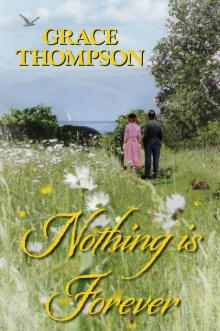 Nothing is Forever
Nothing is Forever Friends and Secrets
Friends and Secrets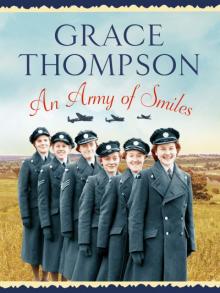 An Army of Smiles
An Army of Smiles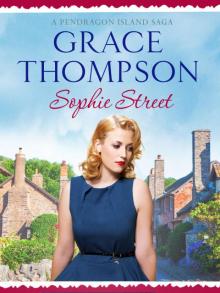 Sophie Street
Sophie Street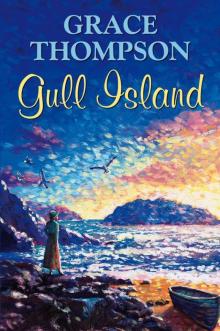 Gull Island
Gull Island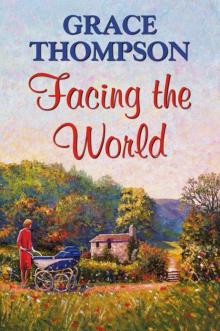 Facing the World
Facing the World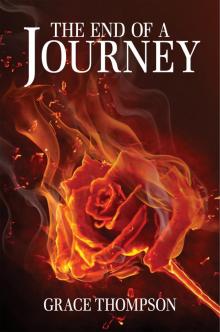 The End of a Journey
The End of a Journey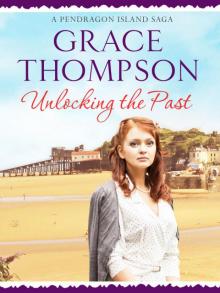 Unlocking the Past
Unlocking the Past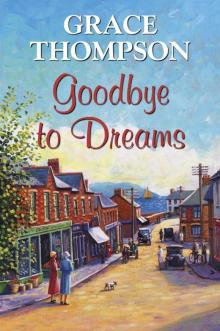 Goodbye to Dreams
Goodbye to Dreams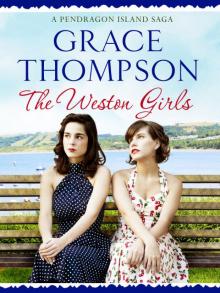 The Weston Girls
The Weston Girls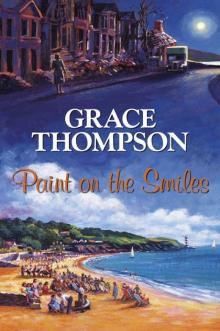 Paint on the Smiles
Paint on the Smiles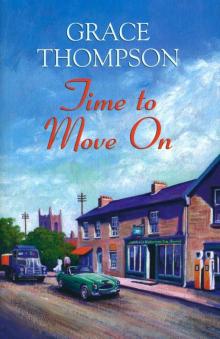 Time to Move On
Time to Move On The Runaway
The Runaway